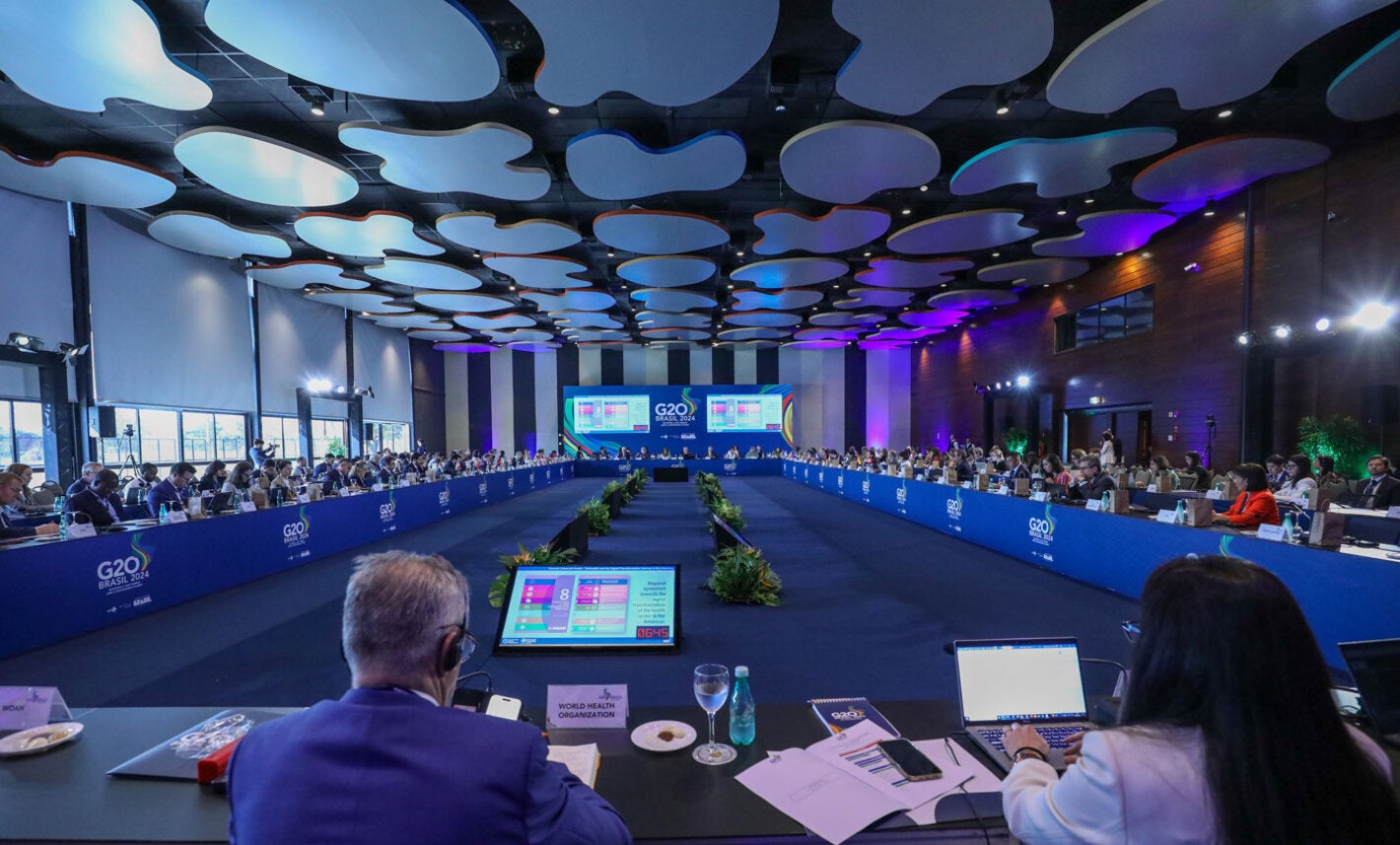
Brasilia, April 15, 2024 - The Pan American Health Organization (PAHO) recently presented a series of recommendations at G20 events in Brazil to strengthen equity in access to digital health, expand innovation and production of health technologies, tackle antimicrobial resistance, increase health investment and ensure greater retention of health workforce in the countries and territories of the Americas.
Digital Health
At the first thematic meeting on April 7, PAHO advocated for expanding equitable access to digital health, including through the sharing of knowledge, resources and tools. At the meeting the following day, April 8, the organization stressed the need to strengthen public policies and regulatory frameworks on the use of telehealth, participate in the co-creation of digital public goods, and implement digital literacy programs for health professionals, among others.
Marcelo D'Agostino, head of PAHO's Information Systems and Digital Health Unit, commended Brazil for its solidarity in sharing digital health knowledge, resources and tools. "The only way to achieve success is to work together as a network,” he said. “All countries have something to share and learn," he said.
He highlighted discussions he had with countries and territories of the Americas to identify priority issues for joint work with PAHO on expanding telehealth, as a tool to reach all people, leaving no one behind. "It is essential - and Brazil is an example of this with its iconic project in the Amazon - to understand the socio-cultural contexts when focusing on the application of any type of digital solution," he stressed.
PAHO also drew attention to the unique challenges faced by Small Island Developing States (SIDS), where the focus on digital transformation in public health must be adapted to cope with limited resources, vulnerability to natural disasters and geographic isolation.
Health financing
At another event on April 8, focusing on investments in digital health, PAHO's Director of Health Systems and Services, James Fitzgerald, highlighted the Alliance for Primary Health Care in the Americas (AxAPS), which the Organization signed with the Inter-American Development Bank (IDB) and the World Bank in December last year. "This Alliance will promote, increase and improve the quality of investments in primary health care in the Americas, including digital health," Fitzgerald noted.
The issue of the debt-for-health mechanism was addressed in a session the following day. The high level of debt is one of the factors that can prevent countries from investing adequately in health and limit the possibilities for action. "PAHO will continue to work with the Ministries of Health and Finance of the countries and with the international financial institutions to improve the availability and quality of health financing in the Americas," said Fitzgerald.
Antimicrobial resistance
In another G20 session on antimicrobial resistance (AMR), PAHO highlighted leading initiatives to increase regional collaboration to identify gaps and coordinate efforts to more effectively tackle AMR.
The unique challenges and opportunities of Latin America and the Caribbean, including the varied climates, socioeconomic conditions and health systems, as well as existing industrial and regulatory capacities, offer a rich context for understanding the complexities of AMR and the needs for adapting interventions to the specific needs of each location.
Innovation and production
On April 10, the Pan American Health Organization supported Brazil's proposal to create an alliance for local and regional innovation and production for health technologies, to be led by the G20.
"The Alliance proposed by the Brazilian presidency of the G20 could promote favorable political and legal environments and integral ecosystems for equitable access, innovation and production, in order to guarantee the public return on these investments," said Judit Rius Sanjuan, Director of Innovation, Access to Medicines and Health Technologies at PAHO.
She also reiterated the Organization's commitment to continue strengthening production, innovation and equitable and sustainable access to health technologies, including through PAHO's Regional Revolving Funds for joint procurement of vaccines, medicines and other health supplies.
Workforce
On the last day of the meeting, held on Thursday (11/04), PAHO presented the Organization’s Health Workforce Policy for 2030, as well as recommendations to ensure greater equity in the distribution of health professionals in the Americas.
A main challenge in the region is the migration of health workers to higher-income countries and territories due to higher salaries and better working conditions. "Caribbean countries need special attention, as the availability of services has already been affected as a result of the active recruitment of specialized nursing professionals outside the country," PAHO's Director of Health Systems and Services James Fitzgerald said.
For the Director of Health Systems and Services at PAHO, higher and lower income countries must work together to address this issue, including through investment in career plans, interprofessional practice and digital literacy.
"PAHO's Virtual Campus, for example, has been strengthening public health capacities for more than 20 years. Today, more than 3.2 million health professionals are participating in the campus," said Fitzgerald, adding that this initiative is also one of the strategies to leverage digital health in the Americas.
G20
The Group of Twenty (G20) is an international economic cooperation forum made up of 19 countries (South Africa, Germany, Saudi Arabia, Argentina, Australia, Brazil, Canada, China, South Korea, the United States, France, India, Indonesia, Italy, Japan, Mexico, the United Kingdom, Russia and Turkey) and two regional bodies: the African Union and the European Union. The Presidency of the G20 is currently held by the Brazilian government.



